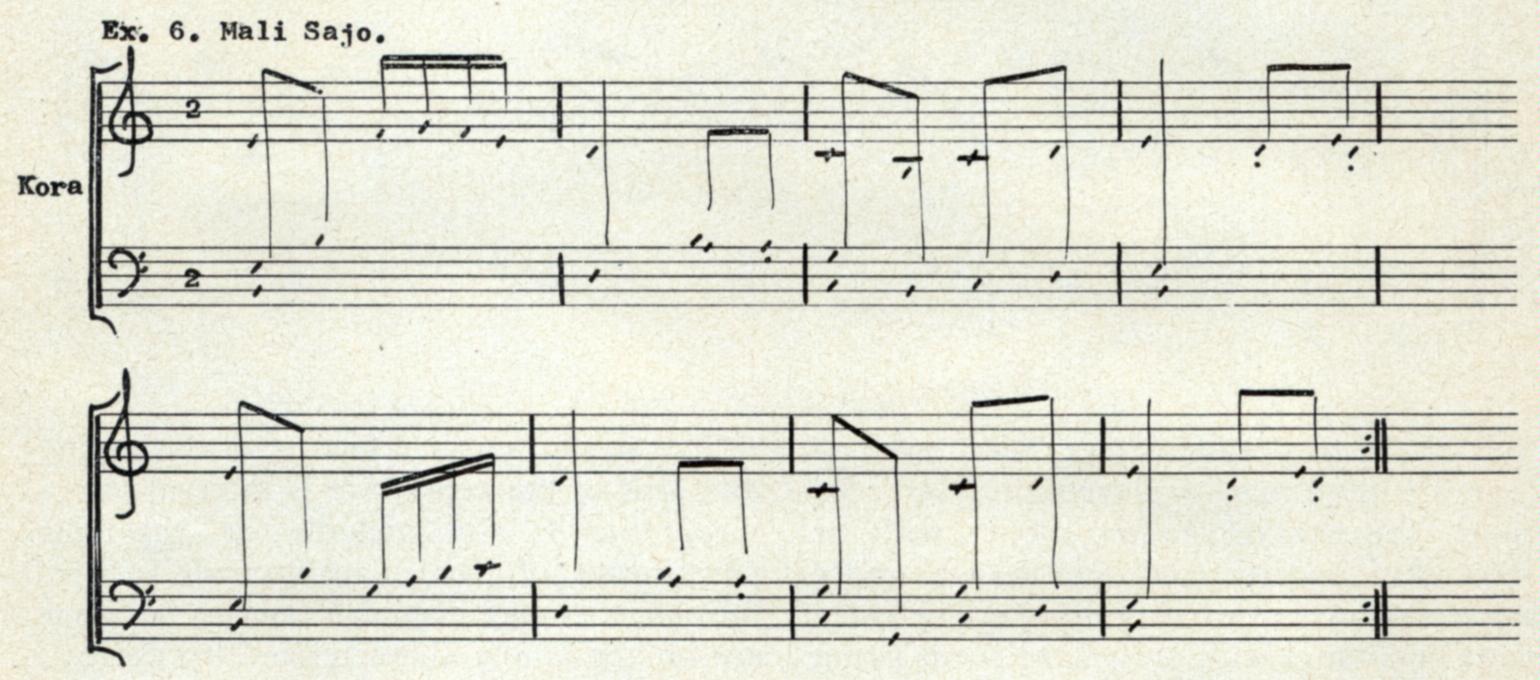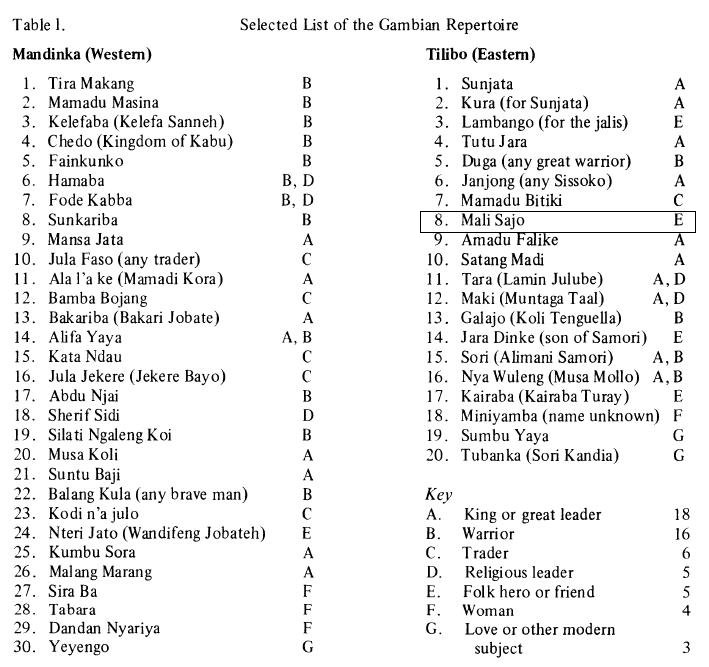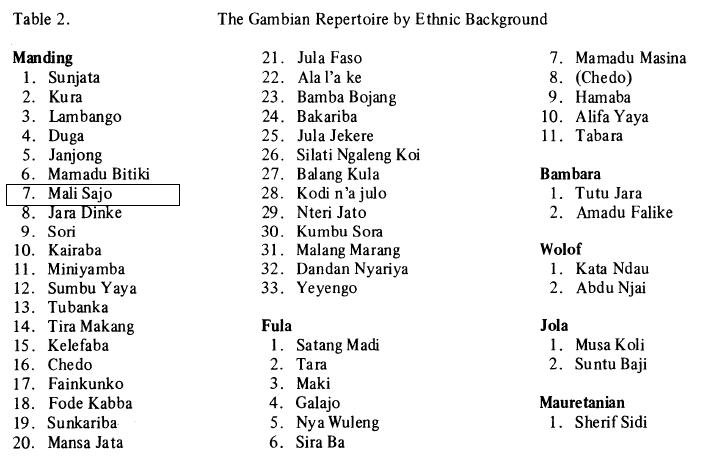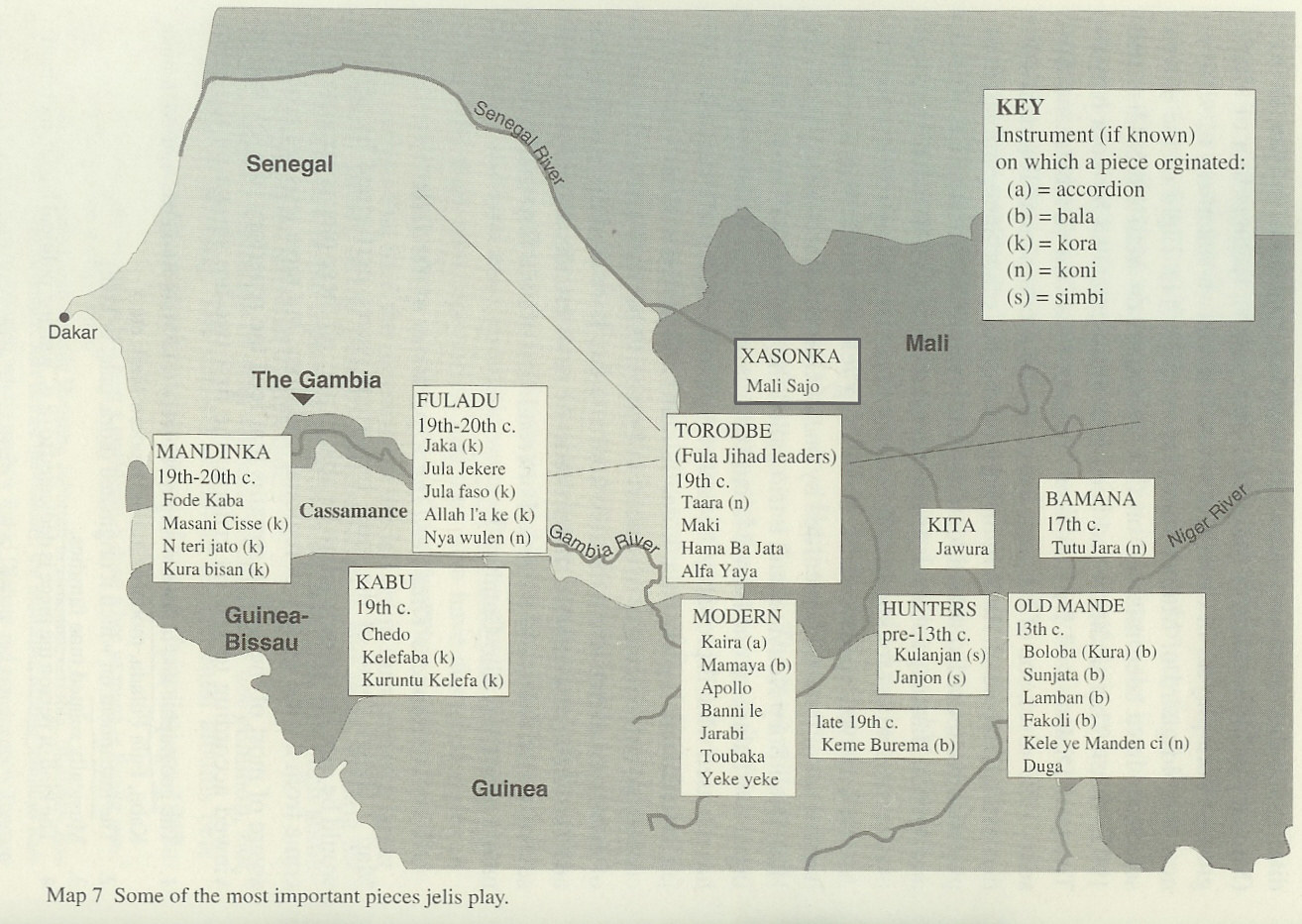mali sajo
Ministère de l’information du Mali. 1971. Première anthologie de la musique malienne: 4. L'Ensemble Instrumental du Mali. Barenreiter Musicaphon, BM 30L 2504.
(Mali Sajo)
This beautiful song from the Kaso country tells a beautiful story about the love a hippopotamus felt for a young girl. Were there ever seen two beings more different?
Hippopotamus of Bafoulabe
How hard absence is;
Your absence oppresses me,
Hippopotamus of Korojube...
King, Anthony P. 1974. "Musical Tradition in Modern Africa." Journal of the Royal Society of Arts 123 (5221): 15-23.
(Mali Sajo)
p. 20

Jobarteh, Amadu Bansang. 1978. Master of the Kora. Eavadisc, EDM 101.
(Mali Sajio)
Mali Sajio (The hippopotamus). Mali Sajio is originally a kontingo piece. Here it is played in Tomara Mesengo, though it may also be played in Hardino. It is a favourite with many musicians because of its melancholy and lyrical melody. The subject of the song is a lengendary white hippopotamus in the upper-river area in Mali called 'Baa Fula Beng' (literally, 'meeting point of two rivers'). Being of a peaceful nature, the hippopotamus allowed people to approach him; gradually the people from the area grew to love and trust him. One day, however, a European hunter came and shot the hippopotamus, occasioning much grief among the people.
The version sung here is merely a fragment. It includes references to the deaths of two great patrons of music, Kelefa Saane (see B2), and Yusuf Maane, who was Amadu's first patron in Yeseu on the north bank of the Gambia river.
(In the translations, repetitions of lines have not been included; praise names are italicised.)
Refrain
Hippopotamus from Baa Fula Beng, the news has taken me by surprise.
Hippopotamus from Baa Fula Beng, it is bad to grow used to something!
I knew it was unwise to make your acquaintance!
Recitation
God's truth, I am afraid of friendship.
Hippopotamus from Baa Fula Beng, friendship is not a good thing.
God's truth, I don't like the friendship of an ungrateful person.
I don't like the friendship of a fickle person at all!
I don't like the friendship of an indiscriminating person.
(Refrain)
Ah, Kunrinka Sirabula Sondombure and Nyalling Jeenung:*
Running prince and standing prince—
But he, too, was claimed by death.
I am certainly afraid of death.
God's truth, I fear death—Kelefa, the Maane's slave
And Joojoo Yusuf Maane of Yeseu, Oh, Joojoo!
God's truth, everything lies in the hands of the Immortal
I am certainly afraid of death!
Yusuf Maane's rule was good,
But his time too is over.
Ah, one king's reign cannot last as long as the world!
Two months will not come out of one.
Two days will not come out of one.
Two kings cannot reign at the same time.
* Kelefa's praise names
Knight, Roderic. 1982a. "Manding/Fula Relations as Reflected in the Manding Song Repertoire." African Music 6 (2): 37–47.
(Mali Sajo)
p. 39
Table One . . . includes the best known, most often heard, or otherwise significant songs in the [Gambian] repertoire. In each column the top few songs are the oldest, and the bottom few are the youngest. The majority in each case fall somewhere in between (often in the nineteenth century), but no chronological ordering beyond this is intended, since it is often not possible to date a song exactly. Most of the songs bear the name of their owner as the title. Where they do not, his name is shown in parentheses next to the title. The letter code at the right represents the person's "claim to fame" or calling in life, as shown in the bottom of the list.

p. 40
Table Two shows the same fifty songs again, grouped this time by the ethnic background of the people commemorated.

Jessup, Lynne. 1983. The Mandinka Balafon: An Introduction with Notation for Teaching. La Mesa, Calif.: Xylo.
(Mali Sajo)
pp. 85–88
Donkilo (on teaching tape)
| I ye Mali Sajo | Eh, Mali Sajo, |
| Sayaa nyaa | How he died. |
Background to "Mali Sajo"
Mali Sajo was a man who was suffering greatly from the shame of a forbidden love affair. He vowed to drown himself in the river, but when he attempted to, he instead turned into a spirit being in the form of a hippopotamus. He lived in Senegal where the Bafing and Bakoi rivers come together. The people befriended him, but unfortunately, he was attracted to a beautiful woman, and re-transforming himself into the form of a man he would go and visit her. He told her the secret of the transformation, whereupon she betrayed him to the colonial office and arranged to have him shot.
Related information
The donkilo contains a play on words. "Malo" in Mandinka means both shame, and hippopotamus, an obvious connection in the story. It is a good story to point out motifs that can be found in the folklore of other parts of Africa and the world such as animistic beliefs, animal imagery, transformation of man to animal, punishment for breaking a taboo, deception by seduction, punishment for certain deeds, and the use of magic powers. (Thompson 1955, Clark 1957.)
pp. 89–94
Mali Sajo
The story, as told by Amadu Joof Jebate, April 1969, OHAD tape 047.
There once was a man, who, according to legend, lusted after his sister. Every evening he would send his sister to fetch water for him. He would say, "Go and get water. I want to bathe." And when his sister was passing he would look at her.
One day he was tempted by Satan. He called his sister and said, "Today I want to make love to you." She said, "But we are of the same mother and the same father from the generation of our grandparents." He said, "That is true, but at the moment I have no wife."
So the girl agreed and made love to her brother. But they hid it from the elders.
If you set fire to the dry grass,
in the long run people will be aware of it.
Every day he made love to her until she became pregnant. The people in the compound, as well as the villagers, were very worried about this.
One day they called all the members of the compound together and said, "Let's have a family discussion."
They said to the girl, "We have not given you to your husband. No prospective husband has brought us kola nuts to chew. We want to know who it is that made you pregnant. If you don't tell us we will judge you according to the Sariyango (Islamic laws) and we will kill you."
The child was frightened and admitted that it was her brother. they called the youth and questioned him. He said he had done it, but it was a mistake.
They forgave him, but banished him from the land. So the youth went secretly to Bafouloto where two rivers meet; one of them is salt water, one is fresh, but if you mix water from the two rivers in a bottle, it will break, and, if you drink the water, your stomach will burst.
The youth stood at the bank of the river and said, "I have come to you to hide me. I am ashamed." he went into the river, but with the help of God he didn't die; he changed into a hippopotamus.
Mali Sajo saayaa nyaa
Bafula bee Mali Sajo bee boorita...
As a hippopotamus, Mali Sajo used to make the river rough so the goods being carried in the factory boats would get spoiled. This upset the Europeans and they didn't know how they could kill the hippo.
At night by the help of God, Mali Sajo would turn himself into a human being and go into the village.
While he was in the river, the hippopotamus heard a very beautiful lady who said she would only marry someone who was as beautiful or more beautiful than she. She would not go to anyone, she cared for no one, and she needed nothing from anyone. Anything she wanted, she always got.
When the women came to the river to do the laundry, the hippo raised his head from the water to look at them. One day he changed himself into a handsome youth and came out of the river. The women saw him and he asked them where the woman known as Jankanju lived. They said to him, "She does not care about people, but we will direct you."
They sent a child with him to show him the place; when they arrived the child said, "They don't allow anyone to enter, but this is the gate to her compound."
The child stood at the gate but Mali Sajo walked in and greeted her, "Salam malekum."
Jankanju didn't answer him. He knocked at the door, and the girl said, "Come in if you want to. I hope you didn't hear my malekum salam."
She turned and saw the young man. Jankanju was putting on seven pines (a kind of wrapped skirt), but when she saw him she dropped them all, and all that covered her was a little white belenbo.
If you quarrel with your wife and she exposes that belenbo, you will promise things you don't have. Your nose will sweat, your stomach will expand, your mouth will quiver, and you will say things you should not have said.
She asked him, "Are you of this earth?"
He answered, "Yes. I love you very much. it is because of the love I have that I am here."
She said, "That's true."
He asked, "You, child; what is your occupation?"
Jankanju repiled, "I am a trader. I go trading and come back."
He called his jali to come and play for her, but he didn't tell his jali that he was Mali Sajo.
Even if you fill the whole world with money, if you cannot make love to a woman, she will run away from you.
Jankanju had learned from the Europeans that it was a hippo that was wrecking their boats. They had asked for help in killing it and had offered anyone who helped them anything that they wanted in this world, multiplied by one hundred.
Women never think of the past. May God forgive me, for they are our mothers.
Mali Sajo saayaa nyaa
Bafula bee Mali Sajo bee boorita....
She forgot what the Mali Sajo used to do for her, and she thought of a scheme to kill the hippo. He was in the river, but he was aware of Jankanju's plan.
Usually when he came to the gate, she put on her head tie, and ran to meet him, but that day she failed to meet Mali Sajo when he stood at the door. He came in and said, "What is the matter?"
She said, "You said you love me, but you don't. We have been in love for seven years, but you have never made love to me."
Mali Sajo laughed and said, "My dear, even if I am in the river and a fly lands on your body I will be aware of it. What you are scheming, if you do it will not get a butut (a penny), and if I die, you will also die. If you must know, the reason I cannot make love to you is that I am a hippopotamus."
So Jankanju paid a visit to her friend, who said to her, "This man comes to visit you, but you never go to visit him. Why?"
"My friend", the girl replied, "You don't keep secrets and it is a secret the person said I must not tell to anyone."
"Since we have been friends, I have never revealed any of your secrets", she answered.
"That is true," said Jankanju. "The person who comes here is Mali Sajo. But he has warned me not to say it to anyone."
"I will not tell anyone," promised her friend. They talked some more, and then Jankanju went home. The friend bathed, put on her clothes and went to visit another friend who said, "What have you come here to tell me?"
"I have something to tell you that I have been warned not to reveal. You must keep it a secret. Jankanju came to me and said her lover is Mali Sajo. She advised me not to tell anyone."
The other woman replied, "Since we have been friends I have never revealed any of your secrets."
This is how the news spread.Soon everyone knew about it, and the Europeans also became aware of it. So they came to see Jankanju. She told them, "You must be patient. He is a hippo and I have to find out what will kill him."
If you love a woman and she does not love you, let her go; women have a lot of techniques, but it is manhood that always conquers them. The person who begot you and others should know you well.
The jali knew she had a plot against Mali Sajo. He became sad and played a kora tune to her, singing:
If I knew this would be the result of our acquaintance,
I would never have made the acquaintance.
Human beings are like cattle, they don't know loyalty.
So Mali Sajo came to visit Jankanju again. He said, "My dear, your schemes are becoming too much. What the Europeans have asked you to do, if I die, you will surely die also."
She replied, "I do your cooking. Anything that you are forbidden to eat, tell me and I won't put it in your food or water."
"Is that so?" replied Mali Sajo.
"Yes." she replied.
Mali Sajo said to her, "You have not yet forgotten your schemes? What I said before is still the same. If I die you will surely die too. The okra that people eat, if you put it in the water, I will not spend the day i the world; if you put it in a gun and shoot me, I will not spend that day in the world. So that is what I cannot have."
They talked all night and then he returned to the river.
The fatal day came. She said to Mali Sajo, "I have seen you in human form, but I would like to see you in the form of a hippo."
"You will see me in all forms if you desire," replied Mali Sajo.
So Jankanju went to the riverside, but she brought three gunmen with her. She hid one on the shore and the second one a short distance away. The third one she hid right in front of the river bank.
She stood on the river bank and sang Mali Sajo's song:
Ayo Mali Sajo saayaa nyaa
Bafula bee Mali Sajo saayaa nyaa
Dali mang kole fo n tala nyaa
Mali Sajo. Bafula bee Mali Sajo
The water first turned blue and then white as Mali Sajo's head came out. His forehead and hands were white like Sajo cattle. The hippo floated on the water; she sand again and he came ashore and put his head on her shoulder. She was moving backwards, coaxing the hippo and singing:
Ayo Mali Sajo saayaa nyaa
Bafula bee Mali Sajo sayaa nyaa
Fo i taata i tambuta kidi ti kiling na
Bafula be Mali Sajo
Ali m mang a long
Bafula ali nga sila janfa la
Jamfa mang bete muumee
Mansa ke jama le banta jamfa le mu
Ali mang e long hadamadingo moko
Mu lu ndo mo le ti.
She passed the second gunman and reached the third one saying, "My dear, stop here," and winked as a signal to the gunman. He shot and the hippo fell down.
Ayo Mali Sajo saayaa nyaa
Bafula bee Mali Sajo saayaa nyaa
The hippo died. They brought his body to the shower room.
"You are a very good woman," said the European to Jankanju. "Come for your pay."
They didn't disappoint her; they put down the money. As she bent to collect it, a short man took out a pistol and shot her in the ear. "Tak. Tak."
She fell down dying on the hippo's body.
"You are the most foolish woman in the world," said the Europeans. "The plans you made, made us able to get this man, a man who has done great things for you. You gave him to us to kill. If someone wants to kill us, you would do the same to us."
Ayo Mali Sajo saayaa nyaa
Bafula bee Mali Sajo saayaa nyaa
pp. 146–59 (Appendix 2: Balafon Repertoire)
| Title | Mali Sajo |
| Translation: | Hippopotamus Sajo |
| Dedication: | Mali Sajo |
| Notes: | Mali also means "shame," animal imagery |
| Calling in Life: | folk hero, friend |
| Original Instrument: | Kontingo |
| Region of Origin: | Tilibo |
| Date of Origin: | M (19th & 20th c. up to WWII) |
| Sources: | 1 (Jessup & Sanyang) |
Knight, Roderic. 1984. "The Style of Mandinka Music: A Study in Extracting Theory from Practice." In Selected Reports in Ethnomusicology, vol. 5, Studies in African Music, ed. J. H. Kwabena Nketia and Jacqueline Cogdell Djedje, 3–66. Los Angeles: Program in Ethnomusicology, Department of Music, University of California.
(Mali Sajo)
p. 10
. . . the hippopotamus enters into the song "Mali Sajo" ("Hippo Sajo") with a clever play on words. According to one of the stories behind this song, a man named Sajo was suffering so heavily from the shame of an incestuous love affair that he vowed to drown himself in the river. Instead of dying, however, he became a hippopotamus. In Mandinka the word for hippo and the word for shame are identical: mali or malo. The words actually sung in this song are very elusive, stating only, "Sajo, hippo of Bafoulabe, where the two rivers meet, (remember) how he died."
pp. 16–17
Example 8. "Mali Sajo" (Hardino, tertiary mode. This may also be performed in the principal mode of Tomora mesengo.) (Tape Ex. 2)

A third and fairly rare mode of Hardino is to place the tonal center on pitch three, yielding a "Phrygian" sound. The song "Mali Sajo" shown above in Ex. 8 uses this mode.
p. 19
Melodically we may discern three types of kumbengo, based on their relationship to the donkilo.
Type I: Parallel. . . . In this type, the kora player duplicates the voice part in octaves, plus an occasional fifth. Since technically any donkilo line may be accompanied in this way, some jalolu maintain that this is not a kumbengo at all, but merely a form of birimintingo, or instrumental variation. Still, some songs are traditionally accompanied in this way. "Miniyamba" and "Mali Sajo" (Exc. 7 and 8) are two of them.
Kouyate, M'Bady, and Diaryatou Kouyate. 1996. Guinée: Kora et chant du N'Gabu, Vol 1. Buda, 92692-2.
(Malisadio)
"Friendship between two men goes unnoticed—friendship between two women as well—but friendship between a man and a woman always gives rise to gossip."
Charry, Eric. 2000. Mande Music: Traditional and Modern Music of the Maninka and Mandinka of Western Africa. Chicago; London: University of Chicago Press.
(Mali Sajo [Sadio])
p. 148

p. 156
Mali Sajo (Fr: Sadio) is associated more with the voice than with any particular instrument. The lyrics tell a story of a close friendship between a young girl and a hippopotamus (mali) from Bafoulabé in Xaso territory and its tragic end at the hands of a hunter. Classic versions have been recorded by Sory Kandia Kouyate (1956?-disc, 1970-disc), and Humblot (1921:139), reporting on life in Kankan (Guinea) in the early twetieth century, provided Maninka lyrics and a french translation.
p. 250
Older pieces from the jeli's repertory were rare on commercial recordings before the 1960s.13
13. The few tradtional jeli pieces with guitar accompaniment recorded before independence include Mali Sajo (Sory Kandia Kouyate) 1956?-disc), and Sakodugu and Samory, on a Phillips 45 rpm from about 1959 featuring Kavine Kouyate, Kelema Doman, and Odia Conde (Nourrit and Pruitt 1978, 1:48–49).
pp. 398–401 (Appendix C: Recordings of Traditional and Modern Pieces in Mande Repertories)
Unidentified Instrumental Origin: Malisadio
Sory Kandia Kouyate (1970)
Setouman Kouyate (Guinea Compilations 1961a)
Orchestre Régional de Kayes (1970)
Cheikh M. Smith (1992)
Diabate, Toumani. 2001. Jarabi: The Best of Toumani Diabate; Master of the Kora. Hannibal, HNCD 1462.
(Mali Sajio)
This is one of the best known and most loved songs in the traditional repertoire of the Mande griots, here recorded in a flamenco version with Ketama and featuring beautiful vocals from Kassemady. It tells the story of a hippopotamus (Mali), called Sajio (the name of the first child born after twins), who everyone in the village Bafulaben ("Meeting pint of two rivers", a village in north-west Mali) grew to love, but one day he was shot by a hunter. Ultimately, Mali Sajio is sung to lament the death of a king or great person, or a regret [sic] the loss of a loved one.
Chorus:
| Ba fula ben mali sa' | |
| Sa' mali sa', | |
| Oh mali sa', Sa, mali sa' | |
| Ah Mali sajio, Bafulaben mali sajio | Ah mali sajio from Bafulaben |
Solo:
| Saya te bulunda kilin na | Death won't stay just at one door |
| Fo lo se baliya | Unless one day there's no more death |
| Yammari-yo am be wo sigila lun-o-lun | I call on the muse, we're all hoping for that, |
| Alla, ne be mansa juma? | Alla, which king am I talking about? |
| Ah, Mali sajio lara | Ah mali sajio has laid down and died |
| Ko nte la mansa nyuma be laali, | Our beautiful king has gone |
| Ah! Jili Jalali wali kirami Mansi kilin tili te duniya ban | As (verses from the Koran), more than one king reigns on this earth |
| Juru kara naini wo tili bana le—Alla, | Even Alexander the Great did not live for ever |
| Yamaru-wo saya juru te to dan fen si la | I call on the muse, death leaves no living creature behind |
| Jato nin fana bee be dankan kilina | The womanizer and the boaster are both on the same river bank |
| Ja ja ja! Fama Alla lon man di | It's not easy to know Allah! |
| Eh mali sajio | Oh mali sajio |
| Son nin fana bee be bun daa kilina | The thief and the boaster are both on the same river bank |
| O, Mali Sajio |